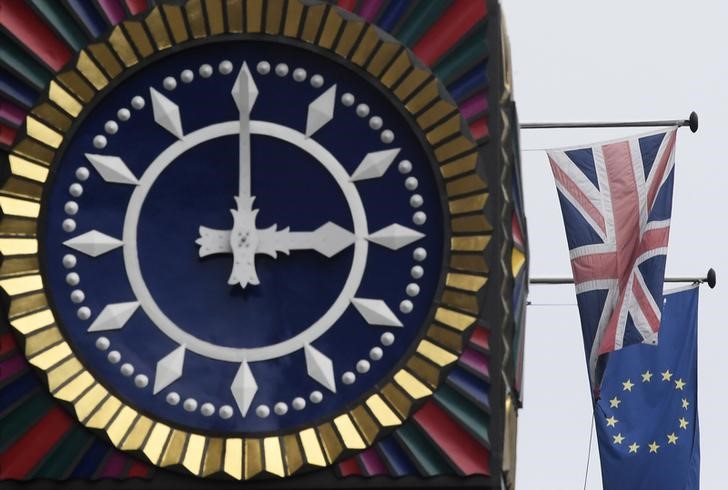 © Reuters. May Plows On Toward Brexit After Resignations Compound Turmoil
© Reuters. May Plows On Toward Brexit After Resignations Compound Turmoil(Bloomberg) — British Prime Minister Theresa May looked likely to survive any attempt to oust her over the government’s Brexit strategy for now, and is leaning on the biggest opposition party to help get the plan through parliament and counter a mutiny by a group of her own lawmakers.
Despite the resignations of two of her most senior ministers in one day — an event without parallel in recent decades — most of her Conservatives appeared content on Monday evening with a proposal that would keep Britain close to the European Union on trade and regulations.
A handful of lawmakers who want a clean break from the EU said privately they had submitted letters calling for a vote of confidence in May, though hadn’t met the threshold of 48 needed to trigger such a ballot. But should they ultimately do so, the prime minister also looked to have enough support.
“May is fighting for her survival,” Mujtaba Rahman, a managing director at Eurasia Group, said in a research note. He put the chances of a confidence vote at 75 percent and her likelihood of winning one at 60 percent. Under the Conservative Party’s rules, “a confidence vote cannot be repeated for another 12 months, so if she survived one, she would have the space to complete the Brexit negotiations,” he said.
More Infighting
The latest chaos for May unfolded within 48 hours of what was supposed to be a breakthrough in uniting a fractious government behind her road map for Brexit. Instead, it underscored the intractability of the issue for a country stymied by infighting as the rest of the continent looks on.
With less than nine months to go before the U.K. formally calls time on its membership of the world’s biggest trading bloc, a small hardcore group still has the capacity to make serious trouble if it feels the prize of Brexit is being taken away.
May lacks a parliamentary majority, so she can only pass legislation if her party is united or if she borrows support from across the aisle. On Monday, her office attempted to woo lawmakers from the opposition Labour Party, a move that outraged dissident Conservatives, who are prepared to vote to block her plan if it comes to the House of Commons unchanged later in the year.
“There is one issue of grave concern and that is that the government has been briefing Labour members of parliament,’’ Jacob Rees-Mogg, chairman of the pro-Brexit European Research Group, told reporters. “If the government plans to get the deal through on the back of Labour Party votes, that would be the most divisive thing it could do and it would be a split coming from the top.”
Labour Overtures
That isn’t the only problem for May, whose statement to parliament on Brexit on Monday was turned into a two-hour defense of her policy of seeking a softer divorce from the EU.
Labour’s Brexit spokesman, Keir Starmer, made clear that the party wouldn’t be officially supporting her. While some Labour lawmakers might be tempted to vote for a Brexit that kept the U.K. inside the EU’s customs union, they too were clear that the prime minister’s proposals didn’t go nearly far enough.
“When will the prime minister go further and accept that we need to include more in this deal and that we need to be part of the internal market of the European Union?” Labour lawmaker Alison McGovern asked. May replied that wouldn’t be possible because of the requirements of membership, including free movement of people across borders.
May maintained the balance of pro-Brexit ministers and those who campaigned to remain in the EU in her top team on Monday as she set about piecing together a new cabinet.
Health Secretary Jeremy Hunt replaced Boris Johnson as foreign secretary and she picked Brexit supporter Dominic Raab to replace Brexit Secretary David Davis. Hunt campaigned to stay in the EU, though since has said would vote to leave if the referendum were held now.
Johnson spoke for angry Conservative Brexit-backers in his resignation letter to May when he complained that voters weren’t going to get the things he’d promised them when he campaigned to leave the EU. “That dream is dying, suffocated by needless self-doubt,’’ he wrote. “It is as though we are sending our vanguard into battle with the white flags fluttering above them.’’
May’s response was caustic. “If you are not able to provide the support we need to secure this deal in the interests of the U.K., it is right that you should step down,’’ she wrote.
High Drama
There are no recent precedents for two secretaries of state and a junior minister resigning in the space of 24 hours in protest at the government’s central policy.
In 1982, three foreign office ministers quit, taking responsibility for Argentina’s invasion of the Falkland Islands. In 1958, the chancellor of the exchequer and two junior ministers resigned in protest at increased government spending.
Even so, when May appeared in parliament on Monday afternoon, she didn’t look like a woman who was facing an existential crisis. Following her statement, she went to a private meeting of the Conservative Party’s 1922 Committee, where she was cheered warmly on arrival and when she left.
Later that evening, Rees-Mogg’s European Research Group met to discuss what many of its members see as a betrayal. There were calls for May to scrap her proposals and tell the EU that the U.K. is leaving without a deal, according to one person who was present.
There were different estimates for how many were at the meeting, ranging from 20 to 30 to, according to one person, more than 80. If the latter number is correct, May would be in serious trouble. But even the smaller numbers are enough to block legislation.
Source: Investing.com




























